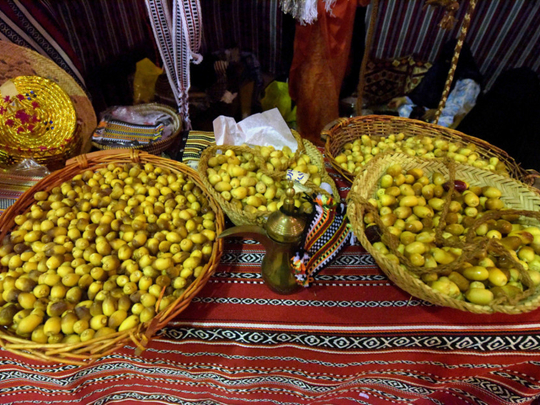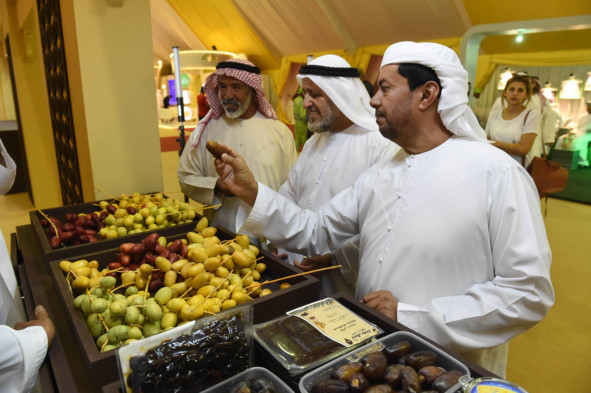
Abu Dhabi: Sporting a new look, the 13th Liwa Date Festival opened its doors on Wednesday to hundreds of visitors.
The 34,000-square-metre festival space is a free-flowing area from the traditional market at one end to the entertainment and award ceremony stage at the other. In between, several private and government companies operating in the fields of dates, agriculture, heritage and environment are exhibiting their products, handicrafts, services and artistry. At the heart of it all, is the Best Dates competition arena where, over the next 10 days, some 6,000 baskets of dates are expected to be judged for their taste, size, look, colour and, of course, health.
It all started with Etheg and Dabbas, the first two date categories to compete. Behind closed doors, local farmers were bringing basket after basket of Dabbas dates and trolley after trolley of freshly cut massive branches of dates, known as Etheg in Arabic.
The top 15 Etheg winners were revealed at 8pm on the first day of the festival. All 30 branches of dates submitted to the Etheg competition were weighed and the farmer who brought the heaviest of them took home the desired title. A 106.5-kilogram Etheg of Shahal variety was crowned the winner.
As in previous years, the UAE’s most popular varieties of dates will be part of the Best Dates competitions, including Khallas, Farth, Kunaizi, Bou Maan and Shishi. Also as in previous years, the dates’ submissions take place in one evening, while the judging and awarding take place the following day. Farms from all over the UAE may enter the competitions, although those from Liwa and Al Ain oasis tend to be dominate the competition.
“Most of the 233 prizes sharing a total of Dh5.2 million are for the Best Dates categories of the competition, awarding up to 15 of the best entries in each category,” said Obaid Khalfan Al Mazroui, director of Liwa Date Festival and director of Planning and Projects Department at the Cultural Programmes and Heritage Festivals Committee - Abu Dhabi, which organises the festival.
“Over the years, we’ve noticed that farmers have made the necessary changes to improve their palm tree orchards, such as cutting down fertilisers, keeping the palm trees disease-free or switching to water-efficient irrigation systems. For this reason, we changed the scoring for the dates competition from 50 per cent for the dates’ quality and 50 per cent for the farm’s appearance to 70 per cent for the dates’ quality and 30 per cent for the farm’s appearance,” Al Mazroui said.
“We also have a competition for the best farm model east of Liwa City and the best farm west of Liwa City, and this year we are only awarding new entries, not previous winners, to encourage more farmers to upgrade their farms and follow healthier agricultural practices,” he added.
He further pointed out that date palm farming is still a lucrative business, particularly since date palm owners receive full support from the local government.
“Apart from the festival’s prize awards, farmers receive support from the Abu Dhabi Farmers Services Centre, Abu Dhabi Food Control Authority, and Al Foah Company, which is buying all the dates from farmers, not just from the winners, but all the farmers who wish to sell”.
Taking place every July, the Liwa Date Festival marks the beginning of ratab (half-ripped dates) season in the UAE, a season that usually starts from Oman in June, continues in the Emirates and ends in Saudi Arabia in late September, or in October.
Mazeirah, now known as Liwa City, is the main town of the Liwa oasis, in the south-west of Abu Dhabi emirate. Some 20,000 people live in the 60 villages scattered along the 100-kilometre-long crescent-shaped oasis, which is a gateway to Rub Al Khali (the Empty Quarters) desert and the biggest oasis of its kind in the Arabian Peninsula. It was for its diverse geographical and environmental features that Liwa was chosen to host the ratab festival 12 years ago.
Another senior official pointed out that July is the beginning of the dates season in the UAE and the government is promoting not only the agricultural and business side of the ratab harvest, but also the heritage aspect, which attracts tourists as well.
“We are trying to enhance the festival, enhance it from an environmental point of view, enhance its family-friendly aspect — we have a place for kids to play while parents shop for dates and other products — and also tourism is now growing in Liwa,” said Eisa Saif Al Mazroui, deputy chairman of Cultural Programmes and Heritage Festivals Committee – Abu Dhabi and member of the Higher Organising Committee of the Liwa Date Festival.
“There are more hotels, more leisure activities and safari trips, which help introduce Liwa to the public, especially to visitors from the northern UAE, who don’t usually come to Liwa,” he added.
The festival is not only bringing tourism to Liwa and adds to the economy of Al Dhafra region, but also preserves old Emirati traditions, passing them on to the younger generations.
“Dates production and palm tree crafts have been a custom in Abu Dhabi and other regions of the emirates for hundreds of years and with this festival, we are also trying to teach our younger generations about the old traditions, how to grow and protect the palm tree. It’s not an easy job; you can’t just come and collect the fruit in the summer — you have to care for the palm trees throughout the year, know when and how to prune them, how to treat it for diseases in order to get tasty, healthy dates,” Al Mazroui said.
For the first time this year, seminars and workshops will be hosted during the festival, discussing modern, sustainable farming methods, meant to increase both quality and yield of ratab.
The festival will continue until July 29, and is open to the public daily from 4pm to 10pm.













